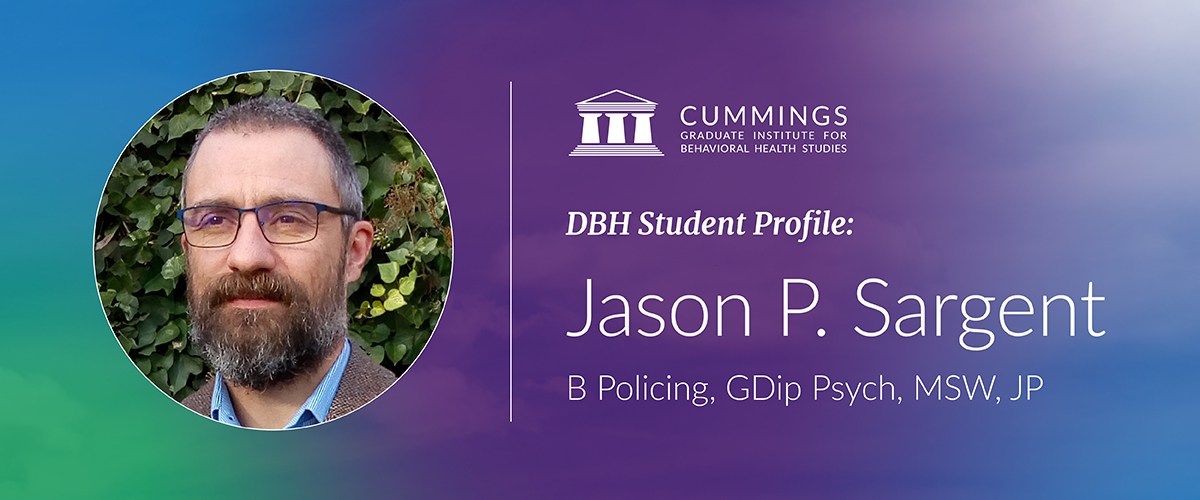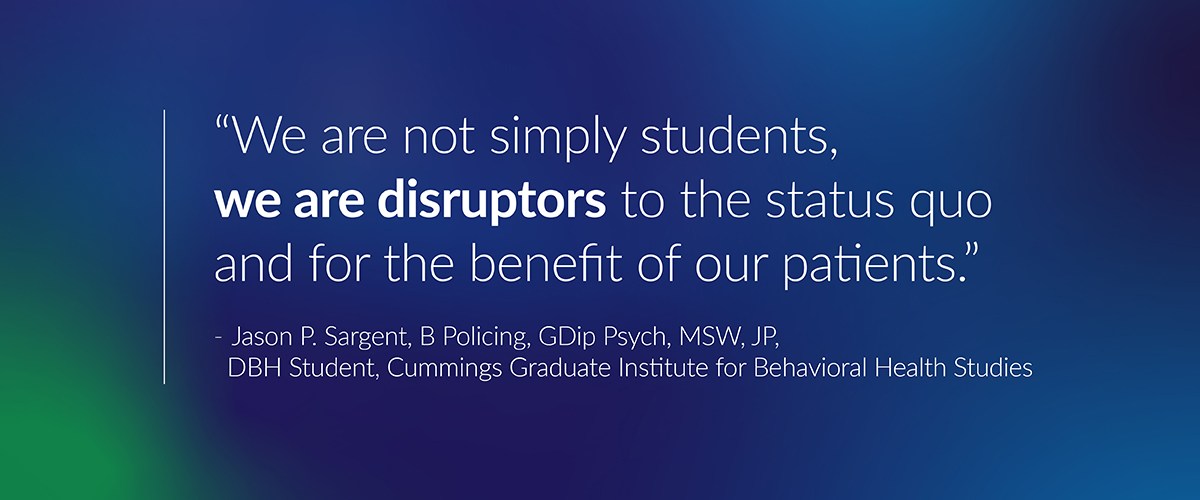 Transformational Leadership in Behavioral Health: Jason P. Sargent’s Story of Advocacy and Practice
Transformational Leadership in Behavioral Health: Jason P. Sargent’s Story of Advocacy and Practice
December 10, 2024
Jason P. Sargent began his career in 1986 as a chef apprentice before joining the Australian Army. He then served in the Australian Federal Police (AFP) as a Counter Terrorism First Response (CTFR) Officer. During his tenure with the AFP, he participated in significant operations, including the Tampa Incident and Operation RAMSI in the Solomon Islands. After leaving the police force, Jason transitioned to roles with the Department of Defence and another Commonwealth Government Department. In 2014, he was diagnosed with PTSD stemming from his deployment to the Solomon Islands. Determined to channel his experiences into helping others, he pursued higher education, earning a Bachelor of Policing, a Graduate Degree in Psychology, a Master of Social Work, and several specialist mental health certifications. In 2018, after completing his master’s degree, Jason founded his first mental health clinic, Healthy Mind International PTY LTD, which has since expanded to three locations in South Australia, focusing on trauma, autism, and other mental health conditions. Committed to advancing his expertise, he enrolled in the Doctor of Behavioral Health (DBH) program in 2022 and initiated a partnership between Healthy Mind International PTY LTD and Cummings Graduate Institute for Behavioral Health Studies. In this interview, Jason shares insights and highlights from his DBH student experience, partnership with CGI, and recent opportunity to present before the South Australian Select Committee on Police Mental Health.
How has the DBH program transformed your understanding of behavioral health and influenced your career?
The DBH has enriched my knowledge across the whole of the health care and mental health practicing sphere. It has not only increased by practice knowledge, but has also been a fundamental mechanism to enable me to better engage with a wide cohort of clinicians. It is and will continue to greatly guide my future clinical practice.
What innovative approaches or strategies do you believe have the potential to revolutionize the behavioral health landscape?
Adopting the Biodyne model and looking at health care from a change perspective to prevent mental health presentations and to reduce or better manage them has been a fundamental approach that I have adopted as part of the DBH.
If we look at mental health from more than a presentation or cause based view and rather include in that look one that includes, Diet, lifestyle, social, cultural, environmental, then we are looking at the presentation from such a wide view that we cant help but to change the behavioral landscape.
Looking back at your DBH journey, what specific insights or skills have you gained that have been instrumental in your professional development?
Understanding the Biodyne model is the initial element and how it flows into every aspect of a clinicians and patients’ life. Gaining knowledge of pharmaceuticals and their application so that I am better informed and am better able to inform my patients is another developmental point. Neurological learnings have also greatly enhanced my own knowledge and the insights I am able to pass on to patients. Learning to reflect on my own practice model, and my own written expression in the papers and assignments I complete has greatly improved my academic skills.
I think overall the consistent ability to use the knowledge gained is a testament to the DBH model and course. Being able to offer insights to other medical specialists and have them not discount you is one of my highlights.
Why did you choose for your business, Healthy Mind International PTY LTD, to partner with Cummings Graduate Institute for Behavioral Health Studies?
As I am undertaking the DBH, and I could see the inherent value in the DBH Degree, I wanted to enable my staff to also have the ability to undertake the DBH. Secondly as I am in Australia, I wanted to start being part of the growth of Cummings Graduate Institute in Australia.
What are your future career goals within the behavioral health sector and how do you envision the DBH program contributing to your success?
My future goals are to use the knowledge from the DBH to enhance my clinical practice, and to obtain a lecturing position with CGI and a University in Australia. As an education partner with CGI I also want to grow the number of people in Australia pursuing the DBH and as such want to establish a CGI study hub in Australia
How do you view the role of leadership in advancing behavioral health outcomes, and in what ways has the DBH program prepared you for leadership positions?
As the Director of my own company, the DBH subjects that engage in quality improvement, management, and how to integrate the Biodyne model into your practice have substantially improved health outcomes for my patients due to the knowledge I have learned. This includes in the area of legal and ethical where I am now better able to guide patients in relation to practices of others that may not be in keeping with ethical and legal guidelines. Overall, the DBH has created both a foundation and future proof practice model for me.
In 2024, Jason was invited by the South Australian Police Service to provide evidence to the Parliamentary enquiry into the South Australian Police Service’s management of officer mental health. Jason shared the following about his experience and outcomes of his presentation.
How did the opportunity present itself to go before the South Australian Select Committee on Police Mental Health in 2024?
The South Australian Parliament publicly announced the Enquiry into Police Mental Health, and called for submissions from all members of the public. As a provider of Mental Health Services to many South Australian Police members in the trauma space, and observing the failings of the South Australian Police that directly impacted my patients, I felt I had an obligation to my Police patients to advocate for change and provide the inquiry with the perspective of a clinician.
What are some highlights from your presentation?
The ability to present and hopefully make a change was a highlight. Many of the Police members I provide therapy to have expressed their thanks for my advocacy for them. I feel as a clinical professional I have had my professional voice heard in probably one of the most important legislative organizations in the State, and that is a wonderful feeling.
I also feel that being a DBH candidate demonstrates to other DBH candidates that we are not simply students, we are disruptors to the status quo and for the benefit of our patients.
How did your education and experience at CGI prepare you for this significant opportunity to advocate for police mental health?
Being empowered to be a disruptor, and having undertaken my DBH studies, meant I was well prepared to stand in front of Parliament members and not be intimidated. Also having a depth of intricate knowledge in large part formed by my DBH studies meant that I was not caught off guard, and I could respond professionally and with sound knowledge.
What do you hope will be the outcome of your presentation, and how do you envision it impacting police mental health policies in South Australia?
My hope is that South Australian Police are forced to admit their failings and implement sound mental health support policies for their police members. I have already offered myself at the hearing to be a member of any advisory panel for this process. My overall hope is that my single voice may just be a catalyst for change in a world that still views mental health as something to ignore.
Jason’s journey exemplifies resilience, determination, and a profound commitment to transforming Australia’s behavioral health landscape. From his early career in law enforcement to founding Healthy Mind International PTY LTD and pursuing the Doctor of Behavioral Health, he has consistently turned challenges into opportunities for growth and impact. Through his studies in the DBH program and his advocacy efforts, Jason continues to drive meaningful change, both in his clinical practice and on broader platforms such as the South Australian Select Committee on Police Mental Health. His work serves as an inspiration, highlighting the power of knowledge, leadership, and a relentless pursuit of better outcomes for those in need.individuals and communities in need.
Connect with Jason Sargent
Healthy Mind International PTY LTD: http://www.healthymind.international/
Jason Shares What the DBH Means to Him
Jason Shares Why He Chose the DBH Program
Learn More About Jason’s Presentation to the South Australian Select Committee on Police Mental Health
 Championing Police Mental Health in South Australia
Championing Police Mental Health in South Australia
Jason P. Sargent, B Policing, GDip Psych, MSW, JP, a Doctor of Behavioral Health (DBH) candidate at Cummings Graduate Institute (CGI), has taken his expertise and passion for mental health to the South Australian Select Committee on Police Mental Health. Jason’s testimony before the committee provided a powerful blend of professional insight, lived experience, and an urgent call for systemic reform.






























